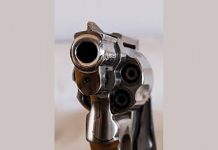
Bill revised, approved for final vote
In a rare weekend session of the Florida Legislature, the state senate approved the Marjory Stoneman Douglas High School Public Safety Act for a final vote to take place on Monday.
The sweeping bill includes provisions for “temporarily restricting firearm possession by a person who is undergoing a mental health crisis and when there is a threat of violence” as well as a number of safety measures aimed at Florida schools. An Office of Safe Schools is proposed to oversee and coordinate efforts to both prevent and better prepare for emergency situations. There are also provisions in the bill for a program that would allow qualified volunteer teachers to be armed in schools.
The bill is available on the Florida Senate’s website.
—
The most controversial aspect of the Senate bill is what it calls the “school marshal program.” A sheriff can choose to implement such a program in their county, appointing qualified volunteers as marshals who would be able to carry guns. That is to say, after some training and instruction, certain teachers would be armed as school marshals.
There are a number of things that would have to happen in order for a teacher to carry a gun. Most importantly, both the school district and the county sheriff have to agree to a school marshal program. Training and instruction for volunteers requires 132 hours of a willing teacher’s limited time. They also have to “successfully complete at least 12 hours of a certified nationally recognized diversity training program”.
School marshal programs are slated to get $500,000 per year statewide. It will also require $67 million up front. This money will go to the Department of Education, which will allocate it to participating sheriffs’ offices.
School marshals would get $500 as a one-time stipend.
—
The minimum age to purchase a firearm would be raised to 21 with this legislation. In addition, the mandatory three day waiting period between purchase and delivery of a gun can last longer than three days if the background check has not yet been completed.
However, measures proposed to ban the sale of assault rifles create a registry for fireams, and allow comunities to impose tougher gun laws than the state were all voted out of the final bill on Saturday. The senate’s Republican majority opposed the sweeping changes to the state’s gun laws, and as a result they will not be included in Monday’s final bill.
—
The proposal before the senate on Monday would create a path for law enforcement officers to temporarily hold the weapons of somebody they believe to be a direct danger to themselves or others. An officer may file for a Risk Protection Order with a court, and if they can convince the court the person in question is dangerous they can temporarily seize the guns.
Risk Protection Orders are going to come with end dates. Once they expire, the authorities must return a person’s guns and ammunition.
Restrictions on firearms would be imposed on people under involuntary examination, who also pose a “potential danger to himself or herself or others and has made a credible threat of violence against another person.” Law enforcement officers may seize guns and ammunition in those cases, though they must also return those weapons once the person who owned them is no longer under examination.
Behavioral health services are a significant part of the proposal. School districts across the state will be receiving an additional $69 million as they strive to better address students’ mental health issues.
—
The bill would create the Office of Safe Schools within the Department of Education. The Office of Safe Schools “shall serve as a central repository for best practices, training standards, and compliance oversight in all matters regarding school safety and security, including prevention efforts, intervention efforts, and emergency preparedness planning.” The office will also award grants.
Each school will eventually be required to have a threat assessment team, “whose duties include the coordination of resources and assessment and intervention with individuals whose behavior may pose a threat to the safety of school staff or students consistent with the model policies developed by the Office of Safe Schools.”
—
Should this be passed, the Department of Education will get $25,262,714 to replace Building 12 at Marjory Stoneman Douglas High School, where the shooting took place.














